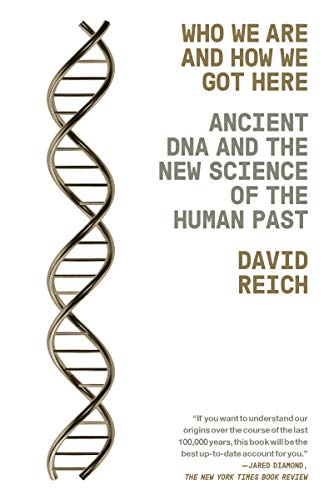7 Best-Selling Genomics Books Millions Love
Explore best-selling Genomics books endorsed by Bill Gates, Christiane Amanpour, and Michael Shermer, offering expert insights and proven value.





There's something special about books that both critics and crowds love, especially in a field as dynamic and impactful as genomics. With advances like gene editing shaping medicine and biology, understanding genomics offers powerful insights into our shared future and heritage. These best-selling books have attracted millions of readers and the endorsement of top experts, confirming their value and relevance.
Bill Gates, co-founder of Microsoft and global health philanthropist, has praised Walter Isaacson's The Code Breaker for its engaging narrative on CRISPR and gene editing. Similarly, Christiane Amanpour, CNN's chief international anchor, highlights the book's balanced view on the ethical challenges involved. Meanwhile, Michael Shermer, publisher of Skeptic Magazine, lauds Svante Pääbo's Neanderthal Man for its pioneering exploration of ancient DNA, reshaping our understanding of human evolution.
While these popular books provide proven frameworks and deep scientific insights, readers seeking content tailored to their specific genomics interests might consider creating a personalized Genomics book that combines these validated approaches with your unique learning goals and background.
Recommended by Bill Gates
Co-Founder & Former CEO of Microsoft
“.@WalterIsaacson is one of my favorite authors. I was eager to read his latest book about CRISPR and its inventor Jennifer Doudna:” (from X)
by Walter Isaacson··You?
After analyzing the race to develop CRISPR technology, Walter Isaacson presents the story of Jennifer Doudna and her groundbreaking gene-editing work. You learn how this tool reshapes medicine, from curing diseases to ethical dilemmas around human enhancement. The book delves into the science behind DNA editing and the intense collaboration and competition among researchers. If you're curious about the future of genetics and the moral questions it raises, this narrative offers both scientific insight and the human drama fueling innovation.
Recommended by Arianna Huffington
Co-Founder of The Huffington Post
“A Crack in Creation, by one of the most pioneering women in science, is both exhilarating and frightening. Jennifer Doudna and her co-author Samuel Sternberg challenge us to confront the possible dangers of gene editing, even as we embrace its incredible potential. This book is a roadmap to our future.” (from Amazon)
by Jennifer A. Doudna, Samuel H. Sternberg··You?
by Jennifer A. Doudna, Samuel H. Sternberg··You?
Jennifer A. Doudna's decades of pioneering work in RNA-protein biochemistry and genome engineering culminate in this revealing account of CRISPR, a gene-editing tool she helped develop. You’ll find detailed explorations of how CRISPR works, from the molecular mechanisms to groundbreaking experiments, alongside a candid discussion of the ethical dilemmas posed by altering genetic code. The book unpacks both promise and peril, making it a thought-provoking read if you’re interested in the future of biology, medicine, or agriculture. With chapters devoted to real scientific milestones and societal impact, it’s suited for anyone wanting a nuanced understanding of gene editing's power and responsibilities.
This tailored book explores the essential genomics methods that have shaped modern biology and medicine, presenting them with a focus on your specific interests and background. It covers foundational concepts such as sequencing technologies and data interpretation while diving into advanced topics like CRISPR techniques and population genomics. By integrating widely validated knowledge with your unique goals, this personalized guide reveals scientifically grounded insights that millions of readers have found valuable. It emphasizes practical understanding of how genomics methods work in research and clinical settings, helping you accelerate learning and apply concepts with confidence.
Recommended by Michael Shermer
Publisher of Skeptic Magazine, Chapman University Fellow
“Congratulations to @love_Neand Svante Pääbo. Well deserved. He lectured for me at Caltech on his new research/book In Search of Lost Genomes, one of the best talks we ever hosted. See how it all began here:” (from X)
by Svante Pääbo··You?
by Svante Pääbo··You?
What happens when a leading geneticist digs into the DNA of our ancient relatives? Svante Pääbo, director at the Max Planck Institute for Evolutionary Anthropology, takes you through his groundbreaking journey of sequencing Neanderthal genomes. You’ll gain insight into the challenges of extracting ancient DNA and how this work reshapes our understanding of human evolution, including interbreeding with Neanderthals. Chapters detail technical breakthroughs and surprising discoveries, making it ideal if you want a scientific narrative that blends genetics with anthropology. This book suits anyone curious about how genomics reveals the deep past, though it leans on scientific detail that may challenge casual readers.
by David Reich··You?
What if everything you thought you knew about human history was incomplete? David Reich, a Harvard genetics professor and pioneer in ancient DNA research, takes you on a journey through the genetic discoveries that are rewriting our understanding of where we come from. You’ll explore how DNA reveals not only our shared origins but also challenges assumptions about population differences and human diversity. Chapters dive into the interbreeding of ancient humans and how genomics intersects with archaeology and linguistics, making this a compelling read for anyone curious about human ancestry and the science reshaping it.
by Mira B. Irons·You?
Unlike most genetics textbooks that focus heavily on molecular theory alone, Mira B. Irons integrates clinical relevance throughout this edition, bridging the gap between basic science and medical application. You’ll explore Mendelian principles alongside case scenarios that clarify how genetics informs diagnosis and treatment in real-world practice. The book’s updated sections on genetic risk assessment and therapeutics offer insights into current challenges and innovations, supported by full-color diagrams and self-assessment questions to reinforce learning. If you’re involved in medical or health sciences education, this text equips you with both foundational knowledge and practical examples essential for understanding human genetics today.
by TailoredRead AI·
by TailoredRead AI·
This tailored book explores gene editing with a focus on fast, practical understanding of CRISPR technology and its applications. It covers fundamental concepts of gene editing, offering clear explanations that match your background and goals. The book delves into how CRISPR works, recent advances, and real-world uses, providing a personalized learning experience that emphasizes rapid results. By aligning with your interests, it reveals insights from popular knowledge millions have found valuable, combining scientific principles with your unique objectives. This personalized approach ensures you gain targeted knowledge to confidently engage with gene editing topics and accelerate your comprehension within a concise timeframe.
by David W. Mount··You?
by David W. Mount··You?
David W. Mount's extensive experience in computational biology shines through in this updated textbook, which delves deeply into the methods for analyzing DNA, RNA, proteins, and entire genomes. You’ll find detailed discussions on statistical sequence alignment, programming for bioinformatics, and data mining, all structured to support both advanced undergraduates and professionals alike. The book’s blend of theoretical concepts with practical problems at chapter ends makes it a solid resource if you want to sharpen your bioinformatics skills or strengthen your understanding of genome analysis techniques. While its technical depth suits those with some biological background, it clearly outlines the computational approaches essential in today’s genomics research.
by Nello Cristianini·You?
by Nello Cristianini·You?
After analyzing key genomic case studies, Nello Cristianini crafted a book that bridges biology with computational methods essential for today's bioinformaticians. You’ll learn how statistical sequence analysis, sequence alignment, hidden Markov models, and gene finding techniques come together to interpret genomic data, with practical Matlab tools demonstrating these concepts. This book suits biologists eager to master computational tools and data analysts wanting a solid footing in genomics. Its clear, example-driven introduction helps you grasp complex bioinformatics without being overwhelmed, making it a solid starting point for anyone serious about computational genomics.
Proven Genomics Methods, Personalized ✨
Discover expert-backed genomics strategies tailored to your goals and background in minutes.
Trusted by thousands of genomics enthusiasts and experts worldwide
Conclusion
Across this collection of seven best-selling genomics books, a few themes stand out: the transformative power of gene editing, the revelations hidden in ancient DNA, and the growing role of computational methods in decoding genomes. These works offer proven frameworks that have helped readers from medical students to curious enthusiasts grasp complex concepts and ethical dilemmas alike.
If you prefer established narratives and clinical relevance, start with By Korf, Bruce R., Irons, Mira B. Human Genetics and Genomics. For a deep dive into gene editing, The Code Breaker and A Crack in Creation provide nuanced views from pioneers in the field. To explore human ancestry through DNA, Neanderthal Man and Who We Are and How We Got Here bring groundbreaking research to life.
Alternatively, you can create a personalized Genomics book to combine proven methods with your unique needs. These widely-adopted approaches have helped many readers succeed in understanding and applying genomics concepts.
Frequently Asked Questions
I'm overwhelmed by choice – which book should I start with?
Start with By Korf, Bruce R., Irons, Mira B. Human Genetics and Genomics if you want a solid foundation in medical genetics and genomics. From there, you can explore more specialized topics like gene editing or ancient DNA depending on your interest.
Are these books too advanced for someone new to Genomics?
Not at all. Several books like Introduction to Computational Genomics and By Korf, Bruce R., Irons, Mira B. are designed to be accessible for beginners while still offering depth for advanced readers.
What's the best order to read these books?
A good approach is starting with foundational texts on genetics and genomics, then moving to focused books on gene editing or ancient DNA, and finally exploring computational analysis to understand modern genomics research.
Should I start with the newest book or a classic?
Newer books like The Code Breaker offer fresh insights into gene editing, while classics like Bioinformatics provide essential computational knowledge. Your choice depends on whether you prefer cutting-edge developments or foundational skills first.
Can I skip around or do I need to read them cover to cover?
You can definitely skip around. Many readers focus on chapters or sections relevant to their interests. For example, Neanderthal Man blends science and narrative, so you can pick engaging parts without reading cover to cover.
How can I get genomics knowledge tailored to my specific goals?
While these expert books cover proven methods, personalized content can better fit your unique background and goals. You can create a personalized Genomics book that combines these popular approaches with your specific interests and skill level.
📚 Love this book list?
Help fellow book lovers discover great books, share this curated list with others!
Related Articles You May Like
Explore more curated book recommendations






